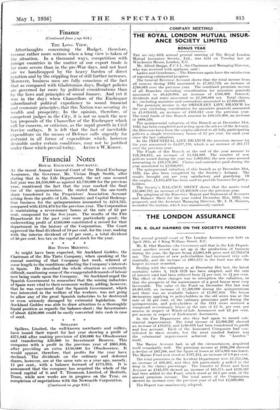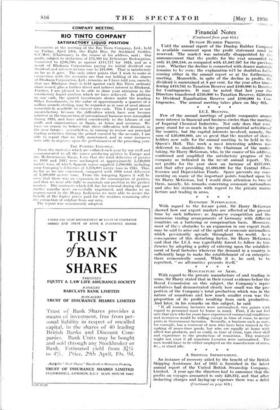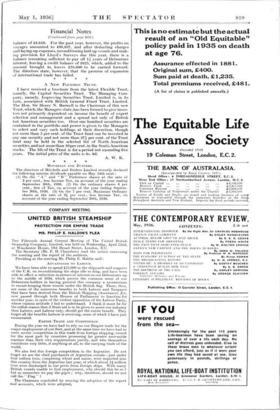Financial Notes
ROYAL EXCHANGE ASSURANCE.
AT the recent Annual General Court of the Royal Exchange Assurance, the GoVernor, Mr. Vivian Hugh Smith, after stating that in the Life Department, the net suns assured last year was £4,350,000 as against £3,750,000 for the previous year, mentioned the fact that the year marked the final one of the quinquennium. He stated that the one-tenth share transferred to the Proprietors' Association -Account arising from the profits of Life, Annuity and Capital Redemp- tion business for .the quinquennium amounted to £214,585, compared with £194,470 for the previous year. The Corporation is maintaining a reversionary bonus at the rate of £2 per cent. compound for the five years. The results of the Fire Department for the past year were particularly good; the underwriting profit of £189,000 constituted a record for that department in the history of the Corporation. The Court approved the final dividend of 19 per cent. for the year, making with the interim dividend of 11 per cent., a total dividend of 30 per cent. less tax on the capital stock for the year.
* * * RIO TINTO MEETLNG.
As might have been expected, Sir Auckland Geddes, the Chairman of the Rio Tinto Company, when speaking at the annual meeting of that Company last week, referred at some length to the conditions affecting the Company's interests in Spain. He described the whole situation as extremely difficult, mentioning some of the exaggerated demands of labour now being made upon the Company. Sir Auckland urged the Spanish Government to remember that the mining industries of Spain were vital to their economic welfare, adding, however, that he was convinced that the Spanish Government, which was interested in the welfare of the workers, was not going to allow any of the great Spanish industries to be destroyed or even seriously damaged by extremist legislation. Sir Auckland Geddes was able to draw attention to a thoroughly liquid position as regards the bakmee-sheet ; the Investments of about 1250,000 could be easily converted into cash in case of need.
* * * * SPILLERS
Spillers, Limited, the well-known merchants and millers, have issued their report for last year showing a profit of £871,943 after making provision of £50,000 for Obsolescence and transferring £50,000 to Investment Reserve. This compares with a profit in the previous year of £861,834, after providing an extra £150,000 for Obsolescence. It would appear, therefore, that profits for the year have declined. The dividends on the ordinary and deferred shares, however, are at the same rate as a year ago, namely, 15 per cent., with a balance forward of /175,935. It is announced that the company has acquired the whole of the issued capital of S. and T. Trounson, Limited, of Redruth, Truro, while new works are in progress on the Tyne, on completion of negotiations with the Newcastle Corporation.
(Continued on page 816.)
Financial Notes
: (Continued from page 8154
DUNLOP. RUBBER PROFITS.
Until the annual report of the Dunlop Rubber Company is available comment upon the profit statement must be reserved. 'The market was naturally. disappointed by the announcement that the profits for the year amounted to only £1,288,244, as compared with /1,687,687 for the preyiou; year. Whether the decline is connected with dearer materials remains to be seen; the explanation wig be doubtless forth- coming either in the annual report or at the forthcoming meeting. Meanwhile, in spite of the decline in profits, the
dividend is maintained at. 8 per cent. for the year after trans- ferring £419,701 to Taxation Reserve and £100,000 to Reserve for Contingencies. It may be noted that last year the Directors transferred £550,000 to Taxation Reserve, 1250,000 to Dividend Equalisation Reserve and £100,000 to Con- tingencies. The annual meeting takes place on May 8th.
* * * * I.C.I. MEETING.
Few of the annual meetings of public companies arouse more interest in financial and business circles than the meeting of Imperial Chemical Industries. Not only does that corn pany stand for so much in the general industrial activities of the comitry, but the capital interests involved, namely, the sum of £50,000,000, are so great that the number of' share- holders now calls for the annual meeting to be held in the Queen's Hall. This week a most interesting address was delivered . to shareholders by the Chairman of the under- taking, Sir Harry McGowan, who, in the course of his address, confirmed and amplified the satisfactory progress of the company as indicated in the recent annual report. The net profits for the year show an increase of £357,000, and that after providing £1,000,000 for the Central Obso- lescence and Depreciation Funds. Space prevents my com- menting on many of the important points touched upon by Sir Harry McGowan, but I would draw attention to two of them, namely, his remarks concerning economic nationalism and also his statements with regard to the private manu- facture and trading in arms.
* * * *
ECONOMIC NATIONALISM.
With regard to the former point, Sir harry McGowan showed how our export markets are affected at the present time by such influence; as Japanese competition and the numerous trading arrangements of Germany with different countries on a bartering or compensation basis. Moreover, most of these obstacles to an expansion in our export trade may be said to arise out of the spirit of economic nationalism which persistently spreads throughout the world. As 'a consequence of this disturbing factor, Sir Harry McGowan said that the I.C.I. was regrettably forced to follow its ten- dencies by adopting a policy of entering upon the establish- ment of local factories wherever the demand in a country is sufficiently large to make the establishment of an enterprise there economically sound. While it is, he said, to be regretted, " no alternative presents itself."
MANUFACTURE OF ARMS.
With regard to the private. manufacture of and trading in arms, Sir Harry stated that in their recent evidence before the Royal Commission on this subject, the Company's repre- sentatives had demonstrated clearly how small was the pro- portion of the Company's total production which was in the nature of munitions and how much smaller even was the proportion of its profits resulting from such production. And later, in his remarks on this subject, he said
`.` If all munition factories were nationalised, two points with regard to personnel must be borne in mind. First, I do not feel sure that men who for years have experienced commercial conditions and incentives would be willing, except in time of crisis, to accept posts in Government factories. Secondly, a business such as ours. for example, has a reservoir of men who have been trained in the making of peace-time goods, but who are equally at home with allied war products, and so could, in time of crisis, turn their skill and experience to the production of munitions. This reservoir might not exist if all munition f ictories were nationalised. The men would have to be either employed on the manuficture of arms, &e., or stand idle.
* * * * A SHIPPING IstraoyEmENT.
An instance of recovery aided by the benefit of the British Shipping Assistance Act of 193.5 is furnished in the latest annual report of the United British Steamship Company, Limited. A year ago the directors had to announce that the profits on voyages amounted to only £20,312, and that after deducting charges and laying-up expenses there was a debit (Continued on page 819.)
Financial Notes
(Continued front page 816.)
balance of £4,810. For the past year, however, the profits on voyages amounted to £98,837, and after deducting charges and laying-up expenses, reconditioning laid-up vessels and mak- ing provision for Lloyd's Surveys due this year, there is a balance remaining sufficient to pay off 11 years of Debenture interest, leaving a credit balance of £625, which, added to the amount brought in, leaves £16,660 to be carried forward. The directors state, however, that the promise of expansion
of international trade has failed.* * * A NEW FLEXIBLE TRUST.
I have received a brochure from the latest Flexible Trust, namely, the Capital Securities Trust. The Managing Com- pany, namely, Improving Securities Trust, Limited is, in its turn, associated with British General Fixed Trust, Limited. The Hon. Sir Henry N. Harwell is the Chairman of this new Trust, which, the Managers state, has been formed to give hives- tors not primarily dependent on income the benefit of expert selection and management and a spread not only of British but American securities too. Over one hundred securities are contained in the portfolio and power is given to the Managers to select and vary such holdings at their discretion, though not more than 3 per cent. of the Trust fund can be invested in any one security and not more than 27i per cent. of the Trust fund may be held in the selected list of North American securities, and not more than 10 per cent. in the South American Stocks. The life of the Trust is for a period not exceeding five years. The initial price of the units is 8s. fid.
A. W. K.
* * *
MITCHELLS AND BUTLERS.
The directors of Mitchells and Butlers Limited recently declared the following interim dividends payable on May 14th next : (1) On the " A " and " B " Preference shares at the rate of 3 per cent., less Income Tax, on account of the year ending September 30th, 1936. (2) On the ordinary shares 6 per cent., free of Tax, on account of the year ending Septem- ber 30th, 1936. (3) On the 7 per cent. Maximum Ordinary shares at the rate of 3} per cent., less Income Tax, on account of the year ending September 30th, 1936.
















































 Previous page
Previous page